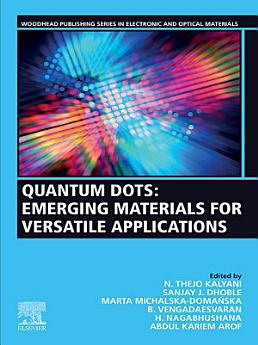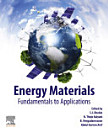Quantum Dots: Emerging Materials for Versatile Applications
About this ebook
About the author
N. Thejo Kalyani is Assistant Professor in the Department of Applied Physics, Laxminarayan Institute of Technology, Nagpur, India.
Sanjay J. Dhoble is a Professor in the Department of Physics at R.T.M. Nagpur University, India. During his research career, he has worked on the synthesis and characterization of solid-state lighting materials, as well as the development of radiation dosimetry phosphors using thermoluminescence techniques and utilization of fly ash.
Dr. Marta Michalska-Domańska graduated in Physical Chemistry at University of Warsaw, completed her PhD at Military University of Technology (MUT, Poland). She took part in the COST project (Action MP 1302) as part of an internship at the University of Tybingen, Germany. She completed her postdoc in corrosion science (AlMagic grant) at TU Delft, Netherlands. She is an expert in the electrochemical synthesis of nanomaterials, especially in the anodization of aluminum and titanium as well as impact of the materials state on its properties. She works in the materials science field and focuses especially on the synthesis and characterization of nanomaterials for photovoltaics, biomedical and spectroscopic applications. She received two awards for her PhD thesis: MUT Rector's Award for distinguished PhD thesis and the Prime Minister Award for the best PhD thesis from all the defended theses in all field in Poland in 2015. In 2016 she received the Scholarship for Young, Outstanding Researchers from the Polish Ministry of Science and Higher Education for her entire academic work. In 2020 she was nominated for “Scientist of Future 2020 by Polish Award of Intelligent Development. She is a member of many international societies, like the International Electrochemical Society or Polish Society of Materials Science. She takes part in many international scientific conferences, also as an Invited and Key Note Speaker. Dr Michalska-Domanska is co-author of more than 30 scientific publications.
B. Vengadaesvaran is Senior Research Officer at the Higher Institution Centre of Excellence (HICoE), UM Power Energy Dedicated Advanced Centre (UMPEDAC), Wisma R&D University of Malaya, Kuala Lumpur Malaysia.
Dr H. Nagabhushana received his B.Sc. degree (PCM), M.Sc, degree (Physics, 1998), Ph.D degree (Physics, 2003) from the Department of Physics, Jnanabharathi, Bangalore University and D.Sc. (Material Science, 2013) from Tumkur University. He worked as a Scientific Assistant at Forensic Science Laboratory, Bangalore from 2004 to 2006. Later he joined Govt. Degree College, Dept. of Collegiate education from 2006 to 2010 and Tumkur University as an Associate Professor in 2012. Presently he is a Professor and Chairman of the Physics Department and continues his teaching and research at Prof. C.N.R. Rao Centre for Advanced Materials Research at Tumkur University. He worked at solid state structural chemistry unit, I.I.Sc., Bangalore on Physics of novel eco-friendly rare earth doped oxide and silicate based nanophosphors with special applications to white light emitting diodes. He worked on various nanostructured materials for radiation and environmental monitoring by utilizing the Pelletron Accelerator at IUAC, New Delhi. Presently he is working on the synthesis of energy saving, ecofriendly, efficient single and multi-phased rare earth doped ions for display devices and radiation monitoring.
Abdul Kariem Arof is a Retired Professor from the Department of Physics, Faculty of Science, University of Malaya in Kuala Lumpur, Malaysia.





